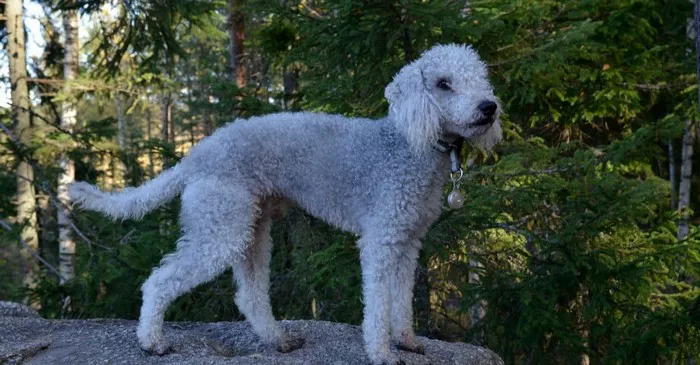The Bedlington Terrier is a unique breed known for its lamb-like appearance and lively personality. To understand the characteristics and traits of this breed, it’s essential to delve into its origins and the breeds that contributed to its development. This article will explore the history of the Bedlington Terrier and the breeds that played a role in its creation.
The History of the Bedlington Terrier
Origin and Early Development
The Bedlington Terrier originated in the mining town of Bedlington in Northumberland, England, during the early 19th century. The breed was initially developed for hunting vermin, such as rats and other small game, as well as for poaching.
Early Use: Miners and hunters in the region needed a dog that was both agile and determined. The Bedlington Terrier fit the bill perfectly with its speed and keen hunting instincts.
Naming the Breed: The breed was named after the town of Bedlington, where it was first popularized. The town’s residents were instrumental in developing and refining the breed.
Characteristics of the Bedlington Terrier
The Bedlington Terrier is easily recognizable due to its unique appearance and distinctive features.
Appearance: The breed has a lamb-like appearance, with a distinctive topknot of hair on its head and a curly, woolly coat. The coat can be blue, liver, or sandy in color.
Size and Build: Bedlington Terriers are medium-sized dogs, typically weighing between 17 to 23 pounds. They have a graceful, athletic build with a slender neck and a slightly arched back.
Temperament: Bedlington Terriers are known for their playful and energetic nature. They are intelligent, affectionate, and make excellent family pets. Despite their gentle appearance, they have a tenacious and courageous temperament.
The Ancestral Breeds of the Bedlington Terrier
The Whippet
One of the primary breeds believed to have contributed to the Bedlington Terrier’s development is the Whippet.
Speed and Agility: The Whippet is known for its speed and agility, traits that were highly valued in the Bedlington Terrier’s early development for hunting purposes.
Physical Traits: The slender, athletic build of the Bedlington Terrier is reminiscent of the Whippet. The Whippet’s influence is evident in the Bedlington Terrier’s graceful and agile movement.
The Dandie Dinmont Terrier
Another significant breed in the Bedlington Terrier’s ancestry is the Dandie Dinmont Terrier.
Appearance and Coat: The Dandie Dinmont Terrier contributed to the Bedlington Terrier’s distinctive coat and topknot. The Dandie Dinmont Terrier also has a unique coat texture and a characteristic topknot of hair.
Temperament: The Dandie Dinmont Terrier’s courageous and tenacious temperament is reflected in the Bedlington Terrier. Both breeds are known for their determination and strong hunting instincts.
The Otterhound
The Otterhound is believed to have played a role in the development of the Bedlington Terrier, particularly in terms of its coat and hunting abilities.
Water-Resistant Coat: The Otterhound’s water-resistant coat likely influenced the Bedlington Terrier’s woolly and curly coat, providing protection in various hunting environments.
Hunting Skills: The Otterhound’s hunting skills, particularly in tracking and scenting, contributed to the Bedlington Terrier’s capabilities as a hunter.
Other Terrier Breeds
In addition to the primary breeds mentioned above, other terrier breeds may have contributed to the Bedlington Terrier’s development.
General Terrier Traits: The Bedlington Terrier shares many common traits with other terrier breeds, such as intelligence, determination, and a strong prey drive. These traits were essential for the breed’s original purpose as a hunter.
Genetic Diversity: The infusion of various terrier breeds helped maintain genetic diversity, contributing to the overall health and vitality of the Bedlington Terrier.
The Bedlington Terrier Today
Modern Characteristics
Today, the Bedlington Terrier retains many of the characteristics that were valued in its early development.
Appearance: The breed’s distinctive lamb-like appearance continues to be a defining feature. The curly, woolly coat and graceful build make the Bedlington Terrier easily recognizable.
Temperament: Bedlington Terriers are known for their playful and affectionate nature. They are excellent companions and family pets, while still retaining their strong hunting instincts.
Health Considerations
Bedlington Terriers are generally healthy dogs, but like all breeds, they are prone to certain health issues.
Copper Toxicosis: One of the most notable health concerns in Bedlington Terriers is copper toxicosis, a genetic disorder that affects the liver. Regular screening and careful management are essential for affected dogs.
Regular Care: Regular veterinary care, a balanced diet, and proper grooming are crucial for maintaining the health and well-being of Bedlington Terriers.
Popularity and Preservation
While the Bedlington Terrier may not be as well-known as some other breeds, it has a dedicated following of enthusiasts and breeders.
Breed Clubs: Various breed clubs and associations work to promote and preserve the Bedlington Terrier. These organizations play a vital role in maintaining breed standards and supporting responsible breeding practices.
Breed Shows: Bedlington Terriers are often seen in dog shows, where their unique appearance and characteristics are showcased. These events help raise awareness and appreciation for the breed.
See also: Can Cattle Dogs Be Left Alone?
Conclusion
The Bedlington Terrier is a unique and fascinating breed with a rich history and a distinctive appearance. Its development involved the contributions of several breeds, including the Whippet, Dandie Dinmont Terrier, Otterhound, and other terriers.
Understanding the ancestral breeds that make up the Bedlington Terrier provides valuable insights into its characteristics and traits. The breed’s combination of speed, agility, courage, and determination has made it a beloved companion and an excellent hunter.
Despite its rarity, the Bedlington Terrier continues to be cherished by enthusiasts and breeders who appreciate its unique qualities. By supporting responsible breeding practices and maintaining a commitment to the health and well-being of the breed, we can ensure that the Bedlington Terrier remains a treasured part of the dog world for future generations.


